Stay in the know on all smart updates of your favorite topics.
How to make smart mobility hubs work for everyone? The why of citizen engagement
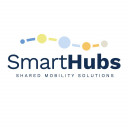
AMS Institute and SmartHubs are happy to announce the third episode of their webinar series on Mobility for the City of Tomorrow on 24 February from 14:00-15:00 (CET).
How to make smart mobility hubs work for everyone? The why of citizen engagement
There are quite some challenges for cities and other stakeholders to make mobility solutions well-tailored for everyone. It starts with finding suitable methods to engage and actively involve different user groups, such as citizens. Subsequently, they have to identify individual user needs with the traveller and co-create transport solutions for the traveller.
With citizen engagement, we try to provide the silent majority with an opportunity to raise their voice. If the SmartHubs project engages the citizen, the city-citizen relation will improve.
Marc Boijens and Laurens van Roozendaal will share some use cases and methods, actively involving the audience.
Decision support systems for locating smart mobility hubs
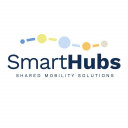
AMS Institute and SmartHubs are happy to announce the second episode of their webinar series on Mobility for the City of Tomorrow on 3 February from 14:00-15:00 (CET).
Decision support systems for locating smart mobility hubs
With the growing use of shared mobility modes comes the need to regulate and organize them into hub access points that offer several modes together. But there's a challenge. How should these hubs be located in a city so that they contribute to mobility sustainability and positively impact its urban fabric?
With that in mind, the SmartHubs project has been developing a decision support tool to help find the best potential areas for installing shared mobility hubs. It comprises a multi-criteria approach that integrates several objectives into the same overall potential score, providing cities with a geographical picture of where they should prioritize their investments.
Gonçalo Homem de Almeida Rodriguez Correia and Miquel Martí Casanovas will explain the method behind the decision support tool, using the city of Amsterdam as an example.
How to build the right ecosystem to make smart mobility hubs work?
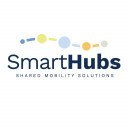
AMS Institute and SmartHubs are happy to announce the first episode of their webinar series on Mobility for the City of Tomorrow on 20 January from 14:00-15:00 (CET).
How to build the right ecosystem to make smart mobility hubs work?
An ecosystem consists of many parties, and it's beneficial for incremental innovation if there, somehow, is a connection between them. But what if your innovation is disruptive and an entire ecosystem has to undergo a transition? How do you find the right partners for your envisioned ecosystem? How can you create a common goal that is equally beneficial for all partners?
SmartHubs are not about technology but about creating an ecosystem with a solid value proposition and the right business models.
Marc Boijens and Laurens van Roozendaal will tell you more about how they tackle the challenges they encounter in the SmartHubs project.
Some of the most inspiring projects of 2021 during our 14th Demoday!
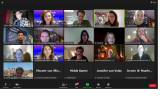
On December 14 2021, we had a very special demo day. Of course, it was the last of the year. As the Amsterdam Smart City core team, we are very proud of all the collaborations our partners and community started and that's why we wanted to highlight a few of them. To give the demoday a typical Christmas vibe, the pitchers had a 'gift' for the participants: their lessons learned that everyone could benefit from. And the participants had a gift in return: answers to the questions of the pitchers. In short, a demo day with new projects, questioning and sharing insights!
Responsible Sensing Lab and Drones
Hidde Kamst of the City of Amsterdam tells the participants about the Responsible Sensing Lab, a collaboration between the municipality and AMS Institute. This Lab works on the implementation of (social) values in technology in the city. Cameras and sensors in public space can put values such as privacy and anonymity under pressure. The Responsible Sensing Lab researches and designs alternatives. This also applies to the subject of Responsible Drones. A group of civil servants, companies and knowledge institutions worked on a vision on the responsible use of drones. The subjects 'proportionality', 'communications' and 'rules of the game' were discussed.
Hidde’s lessons learned: behind the scenes there are many parties working on drones, but the involvement of residents and civil society is low. It is important to change this because drones can have a big impact on our society. In addition, it is a complex topic where more research is needed. Hidde's request for help 'How do you convey the urgency of a subject that is important, but not yet urgent?' was very recognizable for the participants. A selection of their ideas: repeat the urgency over and over again, visualize the urgency, use storytelling and name the risks.
Shuttercam and Measuring Public Space
Pitch 2 had a big link with Hidde's story. Tom van Arman does various sensing projects on the Marineterrein, also covered by the Responsible Sensing Lab. An example is the Shuttercam, a camera that citizens can put on or off. In this way they can have an influence on the technology in the city. We start Tom's pitch with a question to the participants. Do they find it important that we measure a lot and collect data to improve the city or would they rather see more privacy for residents? A question that provokes discussion.
Tom has been engaged in measuring and testing in the public space for years, with an important role for public values. That's why he learned a lot of lessons: make sure you take the time to get legislation in order, take vandalism into account, do everything you can to make your work understandable for citizens. And a very nice one to remember: a hot camera attracts many insects. They block the image or get into the devices. One of the best tips he got from the participants: let passers-by write down what they see. That way you can get great feedback.
Braking energy and Pilot OV E-hub
André Simonse from Firan (Alliander) introduced us to the 'braking energy' issue, or as it is now is called: the OV E-hub pilot. This started as a search with partners such as AMS Institute, Arcadis, the City of Amsterdam, the
VRA and Alliander. Now the process evolved into a collaboration between Strukton Rail, Hedgehog Applications and Firan. Big cities can no longer cope with the increasing demand for sustainable energy. This makes it more difficult to access mobility hubs, such as stations, to provide electricity. It is therefore important to use existing energy smartly.
The lessons learned in this pitch were about taking action. Although talking is important for ideation and understanding and trusting each other, the art is to work together on a targeted plan for implementation. André's request for help was on how to organize political support. Willem from the City of Amsterdam wants to be part of the initiative and can help to achieve official support.
Social side of hubs
Willem van Heijningen of the City of Amsterdam took the floor to tell us more about its hub mission. A hub can organize mobility in an effective way. Together with others, he is looking how Q-park Europarking in the center of Amsterdam can be transformed to a hub. Think of shared mobility, charging cars and logistics, while preserving the monumental character of the city. Hearing the word ‘hub’, many people will think of a place to connect different forms of mobility. But it is also about energy. At some point, vehicles, vessels or even drones will come by. Since we want to get rid of fossil fuels, a hub will also become the place where these forms of mobility are charged. The success or failure of hubs is all in the hands of people. It depends on their behavior whether hubs will be useful. Until now, they have got too little attention. T
his is where Willem could use some help: What is needed to bring the social aspect of hubs further? How does the hub prove its effectiveness towards humans? A selection of the answers from the group: investigating the needs of the residents, connect with existing social initiatives in the city, involve local entrepreneurs.
ArenAPoort LIFE
Else Veldman and Hans Roeland Poolman from AMS Institute took us on a tour to their Southeast Energy Lab. This is a collaboration to accelerate sustainability in the southeast of Amsterdam through practical research, meetings and concrete projects. One of the current projects is the LIFE project, an open platform to plan energy supply and demand in a smarter, inclusive way. An enormous ambition that is driven by partners such as Johan Cruijff ArenA, Alliander, Spectral, CoForce and the Utrecht University. AMS Institute is committed to ensuring this platform is not only a technical contribution to the energy transition, but also provides social value to the inhabitants of South-East.
Hans and Else asked the network to think about the latter. The result was a tidal wave of tips to involve residents: co-develop communication strategies such as storytelling and visualization, pay attention to the result, the dream, show what it means to participate in the process, and above all, invest time.
New narrative for the energy transition
The last pitch was about the New Narrative where Kennisland and What Design Can Do on behalf of RES Noord-Holland have been working on. Dave van Loon from Kennisland told us that a new story about the energy transition is being developed to move away from the negative image, people's concerns and to give a new impulse to the energy transition. This narrative is based on a design thinking process. Subsequently, the organizations developed building blocks to focus on:
- a shared sense of urgency
- a positive future perspective
- inspiration by concrete and recognizable examples and success stories
- a sense of pride
- a way to take of action
Dave's request for help was for a reflection on this process. And the reactions were praising. On the one hand, the feedback focused on how to make the story as concrete as possible for the target groups and on the other hand on reaching the masses, while incorporating those who are left behind.
The next demoday will take in place in February or March. Do you have a nice story to tell or would you like to join as audience? You are more than welcome! Drop a line below to let us know!
Wat Mensen Beweegt wil duurzame mobiliteit in het ArenA-gebied stimuleren

In de Johan Cruijff ArenA vond onlangs de kick-off plaats van Wat Mensen Beweegt, een nieuw onderzoeksproject gericht op duurzame mobiliteit in het Amsterdamse ArenA-gebied.
De Hogeschool van Amsterdam en NEMO Kennislink onderzoeken in samenwerking met eventlocaties ArenA, Ziggo Dome en AFAS Live wat ervoor nodig is om bezoekers te stimuleren duurzamere reiskeuzes te maken.
Vaak gaat het bij dit soort vraagstukken over technische of infrastructurele uitdagingen want die zijn van groot belang. Het gedrag van de individuele reiziger speelt vaak net zo’n belangrijke rol. Daarom richt dit project zich op de belevingswereld van bezoekers. Wat beweegt hen om te kiezen voor de auto, trein of ander vervoer? Hoe kunnen door inzicht te krijgen in de rol van emoties en gedrag betrokken organisaties zoals de ArenA worden geholpen bij het faciliteren van een duurzamer reisgedrag? En hoe kunnen we zorgen dat de bezoeker daar zelf actief aan bijdraagt?
Dit project doet hiervoor een eerste exploratieve verkenning. Resultaten worden in het voorjaar van 2022 getoetst op mogelijkheden om de aanpak die is ontwikkeld verder op te schalen.
Unieke samenwerking
Dit project is een unieke samenwerking tussen de Hogeschool van Amsterdam (Lectoraat Creative Media for Social Change) die creatieve methoden inbrengt en het wetenschapjournalistieke platform NEMO Kennislink dat werkt via constructieve journalistieke methoden. Naast de eventlocaties wordt nauw samengewerkt met het Platform Smart Mobility Amsterdam, ZO Bereikbaar en het Amsterdam Smart City netwerk.
Contact
Wil je meer weten, neem dan contact op met:
Johan Cruijff ArenA
Maurits van Hövell, Consultant Mobility and Environment, m.van.hovell@johancruijffarena.nl
Hogeschool van Amsterdam
Tamara Witschge Lector Creative Media for Social Change, t.a.c.witschge@hva.nl
NEMO Kennislink
Giovanni Stijnen, sr. program & business development, stijnen@e-nemo.nl
Leon Heuts, Hoofdredacteur, heuts@nemokennislink.nl
Kijken voorbij de Floriade | Groen & Gezond Almere Podcast serie 3!
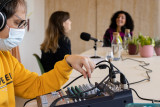
Een groene en gezonde wereld begint in je eigen stad. Nergens in Nederland bouwen ondernemers en bewoners van zo dichtbij mee als in Almere. Verhalen van deze bewogen Almeerders hoor je in de podcast ‘Groen en Gezond Almere’.
Het is alweer tijd voor het derde seizoen, waarin Floriade Expo 2022 centraal staat, want die staat voor de deur! Het gebied rondom het Weerwater staat in de steigers, de groene loper wordt door de stad uitgerold. Maar wat houdt de Floriade nou precies in? En nog belangrijker: Wat blijft er allemaal over ná het evenement? De podcast wordt gepresenteerd door Kookboekenschrijfster, TV-kok en vooral betrokken Almeerder Nadia Zerouali. Nadia bespreekt de fysieke impact van de Floriade Expo op onze stad en spreekt met gebiedsontwikkelaars, energieleveranciers, bruggenbouwers en landschapsarchitecten.
Luister de eerste afleveringen van de podcast via Spotify, Soundcloud & Apple Podcast
Groen en Gezond Almere is het programma van de gemeente Almere waar jij mee kan bouwen aan de groene stad van de toekomst. Een groene en gezonde stad bouw je namelijk niet alleen, maar samen. Het platform laat lokale Almeerse initiatieven en projecten zien die de stad verduurzamen en klaarmaken voor de toekomst. Een inspirerend palet aan stadsmakers!
I NEED YOUR HELP! - Enquête Afstudeeronderzoek ‘The effects of carsharing on individuals' travel behaviour’
Beste netwerk,
Voor mijn studie Construction Management & Engineering (CME) aan de Technische Universiteit Eindhoven ben ik op dit moment bezig met mijn afstudeeronderzoek naar de effecten van autodelen op het reisgedrag van individuen. Daarvoor wil ik een aantal minuten van jouw tijd vragen.
Hoe kun je helpen?
Door het invullen van de online enquête, help je mij bij het verzamelen van gegevens voor het onderzoek naar deze effecten. Voel je vrij om het ook te delen met je eigen netwerk.
Via onderstaande link is de online enquête te bereiken.
ONLINE ENQUÊTE: https://tueindhoven.limequery.com/143597?lang=nl
Ik wil je alvast bedanken voor de aandacht en tijd! Deelname wordt enorm gewaardeerd. Indien je verdere verduidelijking of informatie wenst, neem dan gerust contact met mij op via email (g.a.h.mutsaers@student.tue.nl)
Green Deal ZES MRA Meetup #8

Twee jaar geleden hebben meer dan 50 publieke en private partijen uit de Metropool Amsterdam de Green Deal Zero Emissie Stadslogistiek MRA ondertekend. Daarmee gaven zij aan zich in te willen spannen op weg naar emissie-vrije stadslogistiek in 2025.
In 2025 zijn vrachtvoertuigen in de stad emissievrij. Logistieke en verkeersdata zijn slim gekoppeld. Slimme en schone (stads)logistiek is een belangrijke voorwaarde voor de economische vitaliteit en de aantrekkelijkheid van de regio. In de transitie naar slimme en schone stadslogistiek is de ondertekening van de GDZES MRA in 2019 op en 2020 – op initiatief van de Amsterdam Economic Board – door meer dan 60 partijen van grote betekenis geweest.
Maar hoe staat het er nu voor? Welke acties zijn er door overheden, bedrijven en kennisinstellingen inmiddels opgezet en wat werkt wel en wat werkt niet?
Na anderhalf jaar zoomen organiseert de Amsterdam Economic Board de Green Deal ZES Meetup#8. Op 12 oktober komen we weer live bij elkaar. Hier zullen een aantal succesvolle en onverwachte samenwerkingen worden besproken en heb jij de kans om jouw voorstel, idee of vraagstuk met een korte pitch te delen met de community. En natuurlijk worden de nieuwe ondertekenaars ook nog voorgesteld!
Het programma is als volgt:
Welkom & Introductie
Richard Hoving
Updates & Calls
Met onder andere pitches van:
- Hurby, duurzame regionale sameday avondbezorging – Mark Fontein
- Vervoerregio, Regionale Uitvoeringsagenda Stadslogistiek – Ton Geuzendam (lees ook dit interview)
- Coding the Curbs, op weg naar slimme flexibele infrastructuur – Martijn Pater
- Hogeschool van Amsterdam, Future Food Logistics Challenge – Kees-Willem Rademakers
Introductie nieuwe GDZESMRA toetreders
Met o.a. Cargoledger, Cenex Group, Open Waste, Schneider Electric, CLIC, Alliander,
Goodman, Leap24, Bidfood, Pantar, Coding the Curbs, Babboe Pro, Cipiobox, Hurby, Feenstra, HAVI en EVConsult.
Feestelijk teken- en fotomoment
GDZES MRA Netwerkborrel
Wil je erbij zijn? Dat kan! Meld je aan via de link.
International Lightweight Talks including matchmaking
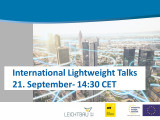
Be part of the International Lightweight Talks on 21.09.2021 from 2.30 pm until 5.30 pm (CET). Are you looking for business or projects partners? You can book bilateral meetings or exchange with experts on smart city, architecture, mobility and circular economy. To register free of charge please follow the link below. The virtual event is organised by BW_i and Leichtbau BW and supported by the Enterprise Europe Network.
https://www.european-lightweight.com/start/events/registration/eventform/international-lightweight-talks-urban-circular-innovative
Have a look at the programme here: www.leichtbau-bw.de/ilt
In case of questions don't hesitate to contact Eva Gutbrod (eva.gutbrod@bw-i.de, +49711 227 87-947).
Onderzoek: Deelmobiliteit in Almere! / Enquête
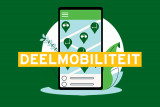
Almere is een stad waarin de mogelijkheden om jezelf te verplaatsen eindeloos zijn. Niet alle vervoersmiddelen zijn even praktisch, milieuvriendelijk of gezond. Veel van onze auto’s staan het grootste gedeelte van de tijd stil op de parkeerplaats. Ze nemen kostbare ruimte in en daarbij zorgt het gebruik van de auto voor een minder gezonde lucht.
Wat is deelmobiliteit?
Een oplossing hiervoor kan zijn om voertuigen te delen. Dit noemen we ook wel deelmobiliteit. Niet iedereen een eigen auto, maar één auto die wordt gebruikt door meerdere personen. Naast een auto kun je ook (e-)fietsen of scooters delen. Deze zijn belangrijk om bijvoorbeeld het laatste stukje van het treinstation of bushalte gemakkelijk naar je werk te komen.
De gemeente Almere is benieuwd hoe jij hierover denkt. Jouw mening kunnen we gebruiken bij het opzetten van deelmobiliteit in onze stad. We gaan betrouwbaar om met uw gegevens en de reacties worden anoniem verwerkt. Vul voor ons de enquête in!
#SmartThursday MRA-platform smart mobility: flexibel ruimtegebruik in de stad
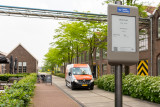
Om onze grote dromen voor een flexibele stad waar te maken moeten we af van het statische systeem van ruimtegebruik. Nu wordt een plek maar voor één doel gebruikt bijvoorbeeld als laad-en loszone parkeerplaats of terras. Hoe mooi zou het zijn als we hetzelfde stukje stad afhankelijk van het moment door digitale middelen op verschillende manieren kunnen gebruiken? Coding the Curbs maakt dat mogelijk!
In deze online #SmartThursday op 16 september van 16.00 tot 17.00 uur vertellen we je wat de eerste geleerde lessen zijn bij het uitvoeren van deze innovatieve oplossing. Wat zijn de kansen en uitdagingen? Wat kost het en wat levert het op? Wie moet betrokken worden om het een succes te maken? We sluiten aan bij inzichten die we hebben opgedaan bij meerdere steden in Nederland én daarbuiten.
De deelstep komt eraan! Geofencing, dropzones en ‘eigenaarschap’ moeten hem temmen.
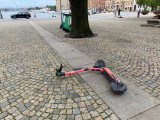
Vanaf medio volgend jaar mogen elektrische deelsteps de Nederlandse weg op. Dat is leuk voor stepfanaten, maar gemeenten kijken met argusogen naar de ontwikkeling. Want in Europese steden zorgen de steps voor veel overlast. Welke middelen kan je als gemeente inzetten om rommelig geparkeerde stepjes en ongelukken te voorkomen?
Podcast met Rijksbouwmeester Floris Alkemade

‘Andere ontwerpprincipes voor een mobiliteitsysteem zijn noodzakelijk.’ Deze podcast met Floris van Alkemade over de kunst van verandering is nog altijd actueel (deze zomer te gast bij Zomergasten VPRO).
‘Vergrijzing kan een enorme maatschappelijke potentie hebben’
Geert Kloppenburg en Alexander van Altena spreken met rijksbouwmeester Floris Alkemade over waarom verandering eigenlijk helemaal niet radicaal is. Wat gebeurt er als je met andere ontwerpprincipes naar mobiliteit gaat kijken? En hoe kunnen we buitenwijken inrichten voor de mobiliteit van de toekomst?
Demoday: Energy meets Mobility

Demodays are part of our innovation process and intended to boost the progress of the various innovation projects, put requests for help on the table, share dilemmas and involve others in your projects or challenges. Invitations are sent but we're always open to adding a few new names to the list.
We host them every 8-10 weeks. During Demo days, community members pitch projects and ask for input and in small groups we work on concrete questions that our partners put on the table. We organize workshops with them and other partners to get a step further in the process. All in a very positive, open and cheerful vibe.
This time on the agenda:
Pitches:
Bottlenecks in Smart Energy - Royal Haskoning DHV
Smart energy is more flexibel; use, production and storage can be adjusted according to the need or capacity of the net. To get where we want to be we need to speed thins along. Royalhaskoning DHV presents research that show the bottlenecks.
Introduction Overmorgen - Arcadis
Overmorgen will be part of Arcadis. Both companies will join forces to make even more impact in realizing a sustainable living environment. As Overmorgen also becomes a Amsterdam Smart City partner via Arcadis it’s good to get to know each other.
CODE the streets - AMS Institute
Creating an app that makes cities less busy and saver, that’s wat CODE the Streets is doing. Our region keeps growing and the same goes for our streets, neighbourhood’s and cities so we constantly need to come up with smart ways to organize mobility.
Innovation partner subsidy - City of Amsterdam
To give the region an economic and sustainable transition boost, the city of Amsterdam has extra funds available. A chance for our network to get subsidy for the plans they work on.
Workshops:
• Knowledge platform Smart Energy - MRA bureau
• Smart mobility as a part of region development - Vervoerregio Amsterdam
• Neighbourhood participation learnings - Pakhuis de Zwijger
•. Improving energy infrastructure for cars at resting areas - Firan
Have a question? Let’s hear it in the comments!
Regional Green Deals presented at EU 100 Intelligent Cities Challenge and EU Blueprint for Local Green Deals published

The Regional Green Deals of the Metropolitan Region Amsterdam were presented by Frank Weerwind, Mayor of Almere at the Mayor’s Summit of the 100 Intelligent Cities Challenge. Together with the Amsterdam Economic Board and Amsterdam Smart City, the Metropolitan Regio Amsterdam acts as a mentor region for the 100 European cities who participate in the challenge to work together on their ambitions for the digital and green transition.
For cities that want to work with their stakeholders on ambitious green deals the European Commission now published a practical guide titled Local Green Deals, A Blueprint for Action.
Find the speech by Mayor Weerwind below
22 June 2022
Honorable guests, ladies and gentlemen,
It is a great pleasure and honor to me to be invited to the Mayors’ Summit of the 100 Intelligent Cities Challenge, and I am very excited to share with you some of my thoughts on the green and digital – or twin – transition in the cities and regions of Europe. I also would like to express my gratitude to the European Commission and the Committee of the Regions for organizing this event on Green Deals and for launching the 100 Intelligent Cities Challenge. By doing this, you recognize the power of cities in the twin transition, you see the need for support for cities to make this transition happen and by this programme, you facilitate the network that cities can create.
My own city is Almere, a new town near Amsterdam and just 45 years old: it was created from scratch on reclaimed land from the sea, and is now a vibrant city with over 215.000 inhabitants. It is a city without ancient history and traditions, but a young city with a strong pioneering spirit, where there is space to experiment and to test innovative solutions in living labs. Our living lab approach has resulted in various circular and sustainable energy innovations in the city, for example: a smart thermal grid for the new Hortus neighborhood. The living lab approach has also led to the choice for Almere as the location for the World Expo on Horticulture in 2022, the Floriade, which will showcase innovations on greening, feeding, healthying and energizing cities, under the umbrella off Growing Green Cities. The twin transition is evidently a core aspect in this event. I will take this opportunity to invite you all to visit the expo next year in Almere.
But this morning I represent not only Almere but the Metropolitan Region Amsterdam, a region consisting of 32 municipalities and two provinces. An economically strong region in Europe with a high quality of life, an international hub with a huge amount of talent, knowledge, innovation and businesses. The Metropolitan Region Amsterdam is one of the so-called mentors in this programme, because we believe in sharing our vision with other cities in terms of knowledge and innovation, but, please, let me assure you that our ‘success’ story has been established, due to knowledge and innovation coming from the cooperation between cities. My aim for now is to continue the dialogue with you on the issues that we are sharing together.
As many of your regions, our region, with an economy highly defined by tourism and services industries, was hit hard by COVID-19. Therefore, we decided at an early stage to investigate, together with knowledge institutions and the business sector, how we could aim for green recovery. We felt more was needed, besides the required regional energy strategies, investing in our energy backbones, which nowadays also include a hydrogen-infrastructure, and ongoing European energy transition projects such as Atelier. We asked the Amsterdam Economic Board to organise this investigation, since they act independently and aim for connecting the companies, research and education institutes and governments in our region. Facing such an unprecedented crisis, we did not want to do this as governments alone, but together with all relevant stakeholders. And, my fellow Mayors, that is a lesson I want to share with you: don’t do it alone.
Based on interactive stakeholder sessions and scenario-planning, we started a trajectory towards green recovery, resulting so far in 3 Regional Green Deals and with these deals, extra focus on skills for sustainable jobs. The Green Deals are: making the textile value chain circular, developing the region as a innovative bicycle hotspot and -for the Netherlands this is really innovative- increase the amount of new-build houses in timber to 20% of the total of new residential building activity.
As a result of those Local Green Deals, we invest faster and more effectively in the economy of today and tomorrow. The aim is to anticipate on changing jobs and the necessary skills, to fill existing and future vacancies and to achieve greater well-being and prosperity in the long term. And that is what we wish for the whole of the European Union.
To conclude, I would like to compliment you with your efforts in the 100 Intelligent Cities Challenge. And please feel free to take a closer look into the work of the Metropolitan Region Amsterdam and to learn, copy the elements that would benefit you, but also to bring your knowledge to us, for example via our online platform Amsterdam Smart City. That way, together we advance in the European twin transition. And move forward to the digital, inclusive and sustainable future of our cities.
Code the Streets - Creating innovative solutions for sustainable, inclusive and safe mobility.

As Amsterdam’s metropolitan area continues to grow, so do traffic related issues such as congestion, crowded streets, and increasing pressures on fragile infrastructures. Just like cities worldwide, the City of Amsterdam is faced with the challenge of finding better ways to manage urban mobility. Code the Streets wants to support cities with this challenge by bringing together cities, mobility providers and science to create sustainable and inclusive mobility solutions that keep cities liveable, now and in the future.
Code the Streets is working on improving an already existing navigation app by adding data about school zones, fragile infrastructures, congestion and pollution. We want to stimulate car-users to choose an alternative route, for example one that avoids school zones or vulnerable city infrastructure. That way we work to towards a more sustainable way of driving and make the streets of Amsterdam safer and less crowded. Starting in autumn, we will be running pilot programs testing the application in Amsterdam. Interested in trying the app? Sign up here.
Code the Streets is an European EIT Urban Mobility Project bringing together partners from Amsterdam, Helsinki and Budapest to work on innovative solutions for sustainable, inclusive and safe mobility.
Note from ASC: What do you think? Let’s hear it in the comments!
Round Table on Urban Insights and Mobility

Join the Swedish Chamber Executive Round Table discussion featuring Bas Dubois (Managing Director Benelux Volvo Bus) and Eugene Grüter (CEO Sweco Netherlands) on Urban Insights and Mobility.
When: Tuesday June 15
What time: 14.00 – 15.00
Greener cities
More than 70 percent of people in European cities breathe dangerous air, according to the European Environment Agency and 1 million deaths occur annually due to physical inactivity in Europe, states the World Health Organisation. The key to a healthier, more productive, greener and less polluted city could be a new planning and design strategy based on the idea of shared speed in urban space.
The pandemic has given us new perspectives and revealed the flaws in street space distribution and public space as it disrupted people’s travel behavior, compelling us to work from home, move shorter distances, and explore the city on a more local scale.
At the same time, about 70 percent of the global population – an astonishing 7 billion people – are expected to live in cities by 2050. With air pollution causing damage to human health and ecosystems, large parts of the population will not live in a healthy environment.
Speakers
Eugene Grüter
Grüter will share the outcome of the new Urban Insight report where Sweco envisions proximity, density, and shared speed as paths for transforming streets into incubators for health and well-being. “A core strategy of streets as health incubators entails treating the city’s various modes of transportation, from driving to walking, as more equal, a planning and design strategy that we call shared speed,” says David Lindelöw, transport planner at SWECO in Gothenburg, Sweden, and one of the report’s authors.
Bas Dubois
Dubois (Managing Director Benelux at Volvo Bus): "Just imagine a city with zero emission vehicles only; clean and silent. Since almost two decades Volvo buses is developing electromobility products and services for cities and in this presentation and Bas Dubois will take you on the journey Volvo buses has made and share the insights and experiences gained.”
Call for all startups on Urban Mobility
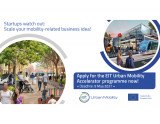
Calling all startups working on solutions for Urban Mobility. Do you want access to cities across Europe? Could your startup benefit from extra go to market coaching? Do you want 5000€ and the change to pitch for a larger amount? Don't hesitate and join now. DEADLINE CLOSES MAY 9.
The pan -European program EIT Urban Mobility is launching it's third acceleration program. AMS Institute based in Amsterdam, a partner in this program, will carry out the program. The municipality of Amsterdam is also a partner, together with TU Eindhoven and Brainport Development.
Circulair ondernemen in Noord-Holland

Provincie Noord-Holland en Impact Hub Amsterdam werken samen om het circulaire ecosysteem van de provincie te versterken. Vanaf 29 april 2021 tot 3 feb 2022 organiseren we maandelijkse expertsessies, netwerkevenementen en masterclasses om je op weg te helpen met circulariteit. Het programma bestaat uit 11 gratis evenementen, waaronder 6 opeenvolgende masterclasses.
Metropolitan Mobility Podcast with Karen Vancluysen (Polis Network)
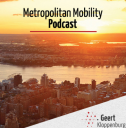
How can local governments deal with (technological) innovations? Listen to the #podcast with Karen Vancluysen of POLIS Network: https://bit.ly/mobilitypod
Stay up to date
Get notified about new updates, opportunities or events that match your interests.

